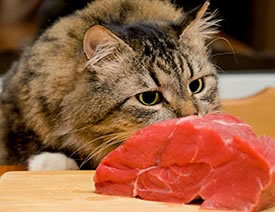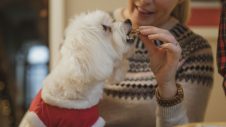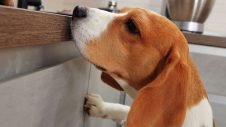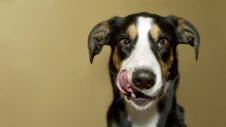 Fresh food is healthy for humans, but is it good for our pets? Discover the potential risks of providing your pet with raw meat and vegetables.
Fresh food is healthy for humans, but is it good for our pets? Discover the potential risks of providing your pet with raw meat and vegetables.
It can be difficult to know which food is best for your pet when there are so many options available. If you prepare your food at home using ‘fresh’ or ‘raw’ ingredients it’s important to consult your vet for advice. Dr Catheryn Walsh of Greencross Vets Robina Village discusses controversial ‘raw food diet’ and how it can affect our pets.
Your pet’s nutrition
Each pet has different needs, and this can depend on a number of factors. Your pet may have specific dietary requirements or health issues to which their breed is susceptible, and it’s essential for you to feed them a diet that’s rich in the vitamins and nutrients they need. This is not possible if your pet is only eating raw meat and vegetables.
There is a thought that dogs and cats should be fed raw food because it closely resembles what they ate in the wild hundreds of years ago before they were domesticated, says Dr Walsh. When dogs and cats used to hunt and kill their food in the wild, they would eat the entire carcass – skin, bones, meat, connective tissue, everything.
This is not what is occurring today when people try to ‘replicate’ raw food diets in their animals,” she explains.
Often people just feed their pets off-cuts that are deemed unsuitable for human consumption. Even if they are fed ‘human-grade’ meat, they are only being fed certain parts of a carcass, for example the muscles only, and this is not nutritionally balanced. Often the food is low in calcium and phosphorus, which is essential for a healthy animal, but can only be ingested in adequate amounts if the pet is eating bones.
It is very important to be aware of what your pet needs to be healthy and happy. For example, cats receiving a high liver diet are at risk of a serious disease called hypervitaminosis A. This disease has shown to be somewhat reversible if cats are put back onto a commercial well balanced diet as soon as they are diagnosed,” says Dr Walsh. Additionally, young animals fed bones and a raw food diet are at risk of nutritional osteodystrophy or nutritional secondary hyperparathyroidism from unbalanced nutrients – both of which are very serious diseases.”
Preparation and hygiene
If you are preparing raw foods for your pet, it is important to remember that pets are also susceptible to the illnesses when eating contaminated or spoiled food.
Many people are becoming ‘raw food’ eaters themselves, and pet owners like to feed their pets the same as they are feeding their families,” says Dr Walsh. However, feeding pets raw meat or vegetables can be risky to both the pet and their human owners, particularly if these foods are not prepared in a sanitary environment.
There is a greatly increased chance of raw pet food being contaminated with harmful bacteria such as Salmonella, Listeria and E. Coli,” says Dr Walsh. “Not only can pets become very ill from ingesting these bacteria, but they can easily pass them on – either directly from the pet to the owner, or through handling the food while preparing it for their pets.
Immunocompromised people and young children are at increased risk,” she continues. “But anybody handling these raw foods could become seriously ill if they contract these bugs.”
Foods to avoid
There are a number of foods that are suitable for human consumption but are not suitable for your pet. Here’s our list of raw foods to avoid when feeding your pet or preparing their meals and why:
- Onions, garlic and chives – these will decrease the lifespan of your pet’s red blood cells causing anaemia.
- Spoiled foods – the bacteria in spoiled foods contain toxins that can damage your pet’s health, making them sick.
- Grapes, raisins and currants – when ingested in large quantities, these foods can cause renal failure.
- Any nuts – nuts are too large and difficult for your pet to digest. They are also very high in fat, which can cause a number of health problems.
- Fruits with stones or pips – these foods are choking hazards or could cause a bowel obstruction in your pet.
- Chicken bones – these bones are particularly dangerous for your pet as they’re smaller and splinter easily, which can damage your pet’s stomach and intestines.Nutmeg – large amounts of nutmeg causes myristicin toxicity, which can result in hallucinations, high blood pressure or seizures.
- Xylitol – this is a sugar substitute found in some products such as lollies that can cause serious harm to your pet.
- Tomatoes – the green parts of the tomato plant are highly toxic to pets.
- Mushrooms – while not all mushrooms are toxic to dogs, it’s still a good idea to avoid this food when preparing your pet’s meals.
- Too much fish – feeding your pet a diet that’s too high in fish can deprive them of essential nutrients.
- Chocolate and coffee – these foods contains theobromine, which can be toxic to pets, and can even be lethal for small animals.
Onion toxicity is particularly serious in pets, and can be dangerous if left untreated. Ensure your food is stored safely in the pantry or cupboard to avoid your pet ingesting harmful foods accidentally. If your pet has ingested any of the above items, consult your local Greencross Vets immediately.

 Greencross Vets
Greencross Vets 






